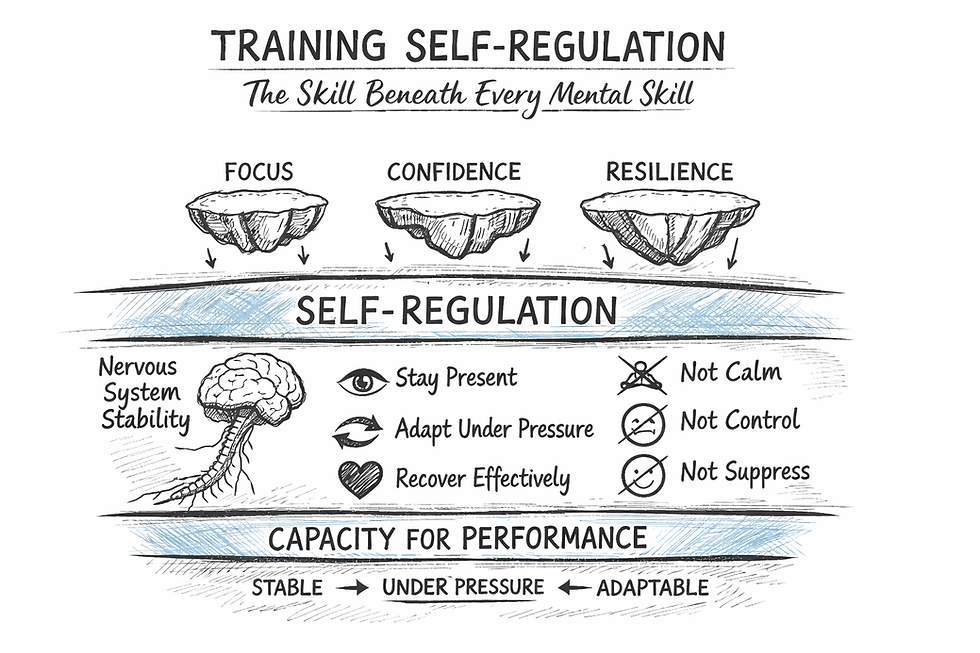Master Your Inner Dialogue: How Neutral Self-Talk Can Boost Your Athletic Confidence
- Kate Allgood
- Dec 13, 2023
- 3 min read
Updated: Feb 6, 2024
In the pursuit of peak performance, athletes often chase the holy grail of confidence: that unshakeable belief in their abilities that fuels their fire and propels them towards greatness. And while the allure of positive affirmations is undeniable, a powerful secret lies beneath the surface: the true master key to confidence lies in your self-talk.
Think of self-talk as the internal soundtrack playing in your head. It narrates your experiences, interprets events, and shapes your emotions. When this soundtrack is riddled with negativity, it's like a cracked record, playing the same tune of doubt and self-criticism, chipping away at your confidence.
But here's the good news: you have the power to rewrite the script. By shifting your self-talk from a negative symphony to a neutral narrative, you lay the foundation for genuine confidence to blossom.
Why neutral self-talk? It's not about sugarcoating reality or ignoring challenges. It's about observing your experiences objectively, without judgment or interpretation. It's about acknowledging your mistakes without self-flagellation, and recognizing your progress without inflated ego. It's about creating a space of clarity and acceptance, allowing you to focus on the present moment and navigate challenges with a calm and collected mind.

So, how do you cultivate this superpower of neutral self-talk? Here are your three-point training plan:
1. Observe, don't judge: Instead of labeling yourself as "bad" or "weak," simply observe your experience. "I feel nervous." "My heart is racing." Acknowledge what you are experiencing without attaching negative labels.
2. Focus on facts, not interpretations: Move away from exaggerating a situation and stick to the objective details. "I missed the target by three meters." "My energy levels are low today." Facts are neutral, interpretations are where the negativity creeps in.
3. Reframe, don't replace: Instead of forcing positive affirmations like "I'm amazing!" try reframing your neutral observations into learning opportunities. "I missed the target, but I can adjust my grip next time." Focus on the "what" and "how" instead of the "why" or "should."
Remember, building confidence through self-talk is a journey, not a destination. It takes practice, patience, and a willingness to be kind to yourself. But with each neutral observation, you chip away at the negativity, paving the way for genuine confidence to flourish. So, turn down the volume on the inner critic, embrace the power of neutrality, and watch your confidence soar!
To your success,
Kate
Envision • Execute • Elevate
About: Kate Allgood is trained in the field of applied sport psychology. She holds two Masters degrees in psychology where she graduated with distinction. She has spent the past 14 years working one on one with high school, college, Olympic, and professional athletes to help them with their mindset, mental performance and mental skills training. Kate has also been a consultant for professional teams, including the Anaheim Ducks primary minor league affiliate the San Diego Gulls, to help the team and players develop their mental game. It is important to note that while Kate has graduate school training in applied sport psychology and general psychology, she does not diagnose or treat clinical disorders, and is not a licensed psychologist.
**The information provided is not to dispense medical advice or prescribe the use of any technique, either directly or indirectly, as a form of treatment for physical, emotional, or medical problems, without the advice of a physician. The information provided is only to offer information of a general nature to help you in your quest for high performance. If you know or suspect you have a health problem, it is recommended you seek your physician's advice.



Comments